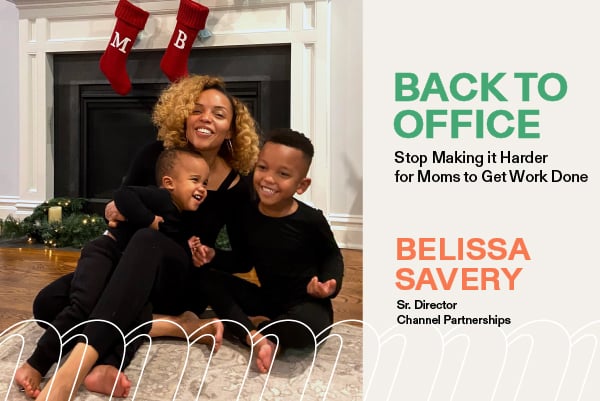Stop Making it Harder for Moms to Get Work Done
As a working mom and primary caregiver, a lack of flexible work options has created an unwinnable dynamic between my professional and personal spheres. I’m one of millions of women who have, for years, tried to find flexibility at work that allows me to not only take care of my family and all that comes with it, but to also have snippets of downtime to mentally recharge. It’s a balance that mainly falls on women, often at the sake of our careers.
The pandemic highlighted this disparity, making the decades-long problem harder to ignore with many fathers at home trying to do the same. Remote work became the norm for those who were able to do their job from home. It offered a glimpse into what life could be like if we weren’t spending hours driving back and forth to the office, using vacation days to cover kid’s appointments, or generally spending our days running in circles (albeit at the cost of all we endured during the pandemic).
Working remotely has proved to be as productive as being in an office, and women are finding their groove in managing their careers and family in ways we never experienced. While many forward-thinking companies are allowing remote work to continue, many are coming out with stringent return-to-office plans, like the lessons we collectively learned during the pandemic now cease to exist.
I’ll say it loudly for the people in the back: being in an office setting Monday through Friday from 8-5 never really worked for most of us. It worked for some, with the advantage towards those without kids, forcing parents to pretend like we don’t have kids either, at the risk of looking uncommitted. Based on the proof of the “work from home” concept over the past two years, most women I talk to, who have the privilege of choosing, will not consider working for a company that requires an onsite commitment. A WerkLabs report notes that candidates are 5x more likely to apply for a fully remote role than a hybrid one.
Companies love to tout awards for “Best Workplace for Diversity” or “Best Companies for Women,” but many are falling back into five days a week in the office. That, coupled with a lack of empathy and flexibility left up to the individual hiring manager, leaves women (specifically women of color) wondering what was so great about them in the first place
Advice for Employers
Listen to your workers. They are trying to tell you working remotely is better for them. If you don’t make accommodations or allowances for it, they will stop telling you what they need and find an employer willing to give it to them.
Sit with the fact that the office environment doesn’t work for everyone. “There are people of color whose colleagues wouldn’t stop asking them how to work the copy machine,” writes Emma Goldberg for The New York Times. “There are the introverts who never wanted to chat about fantasy football leagues. There are the caretakers who used to rush out for school pickup, feeling they were failing to meet unspoken professional expectations and just barely meeting their families needs.”
Educate yourself. Keep listening to the social unrest, learn more about the mental health crisis in our country, and examine microaggressions in the workplace. You may find that not offering flexibility (in whatever form that looks like for each of your workers) is no longer an option.
Finally, use innovations in technology to your advantage. Organizations are collectively spending billions of dollars on digital transformations to make work easier and connect us globally. They’re doing this to enhance resource management, provide a better user experience, encourage a more inclusive culture, and improve productivity – all which sound exactly like the reasons people want flexibility in where they work. So let them.
Lean on Experts
According to a recent Werklabs report, 71% of respondents were drawn to project-based work because it offers greater opportunity to work remotely or work from a place of their own choosing. As leaders in the market with a network of over 900,000+ pre-vetted, experienced, and engaged women ready to make a difference (63% actively looking for contract roles), The Mom Project can purposefully connect you with an ecosystem of highly-skilled moms ready to make an impact.
With the war for talent at an all-time high, leaders need to recognize that if they don’t offer remote work, they’ll miss out on a huge population of skilled workers. In fact, 61% of people working remotely today say they’re not going back to the office simply because they don’t want to, according to a Pew Research study from this year. Gone are the days of justifying why we need flexibility. It should be painfully obvious by now.
I happen to work for a company that understands the assignment, and the flexibility is invaluable. That said, I live in a state of “waiting for the other shoe to drop” with my two-and-a-half year old being sent home for “exposure” an average of 1x per month, for five to ten days at a time, this year alone. And while it’s helpful that my husband is partially remote, the days that he is in the office and the kids are home are as unproductive as they come.
While people admit to not feeling as connected outside the office, all the benefits they do have being at home far outweigh it. “When you look at the fact that a vast majority want to continue working from home in the future, you can see people are making tradeoffs in their mind and are seeing flexibility as more valuable than coworker connection,” said Kim Parker, Pew’s director of social trends research.
Bottom line: Now is the time to be bold and fully activate a flexible workforce strategy. And we’re here for it.
So, what are you waiting for? Reach out to us at info@themomproject.com or click here to learn more about how we can help solve some of the critical business challenges above.

.png)
